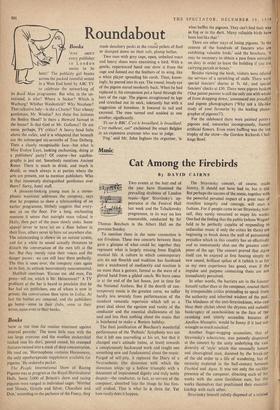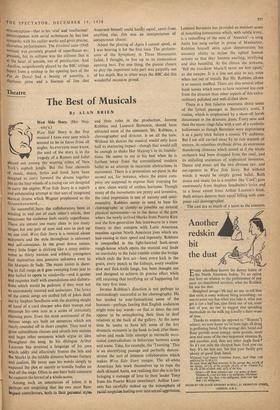Music
Cat Among the Firebirds
By DAVID CAIRNS Two events at the butt end of the year have illumined the To mention them in the same connection is not frivolous. These two concerts between them gave a glimpse of what could be; together they represent what is largely missing from English musical life. A culture in which contemporary arts do not flourish and tradition has hardened into a watchword of mediocrity and reaction is no more than a gesture, formal as the wave of a gloved hand from a gilded coach. We have come in at the end of the last house, just in time for the National Anthem. But if the dearth of con- temporary music is the greatest curse, we suffer hardly less severely from performances of the standard romantic repertoire which tell us a great deal about the egotism and vanity of the conductor and the essential shallowness of his soul and less than nothing about the music that is butchered to make a Roman holiday.
The final justification of Beecham's wonderful performance of the 'Pathetic' Symphony was not that it left one marvelling at his art, but that it changed one's attitude (mine, at least) towards a conspicuously hackneyed work and taught one something new and fundamental about the music. Purged of self-pity, it replaced the Diary of a Neurasthenic (the distortion with which the showman whips up a hollow triumph) with a document of impassioned dignity and truly noble despair—the conductor, in fact, as servant of the composer, absorbed into the image he has him- self evoked. That is what he is there for. Yet how rarely does it happen. The Stravinsky concert, of course, made history. It should not have had to, but it did. But perhaps the success of the music, together with the powerful personal impact of a great man of manifest integrity and courage, will start a fashion. For if people came to see Stravinsky him- self, they surely remained to enjoy his works. One had the feeling that the public (whom Wagner held to be perfectly capable of responding to unfamiliar music if only the critics let them) are beginning to break down the wall of patronising prejudice which in this country has sO effectively and so monstrously shut out the greatest com- poser of the age. The concert proved that Agott itself can be enjoyed at first hearing simply as new sound, brilliant spikes of it (which is as far as my own experience has gone), even if the impulse and purpose connecting them are not immediately perceived.
In other words, the barriers are in the listener himself rather than in the composer, erected there by irresponsible critics pretending to speak from the authority and inherited wisdom of the past. The blindness of the anti-Stravinskians, who can bleat their cliches about the dryness and melodic bankruptcy of neoclassicism in the face of the ravishing and utterly accessible beauties of Apollon Musagete, would be funny if it had not wrought so much mischief.
Another finger-wagging accusation, that of Stravinsky's eclecticism, was patently disproved at the concert by the unity underlying the vast diversity of 'style' which this unusually honest and clearsighted man, doOmed by the break-up of the old order to a life of wandering, has of necessity explored in the half-century between Firebird and Agon. It was not only the cat-like presence of the composer, directing each of his works with the same fastidious care, but the works themselves that proclaimed their essential kinship with each other. Stravinsky himself calmly disposed of a related misconception—that in his 'arid' and 'intellectual' Preoccupation with serial techniques he has lost sYmpathy with his earlier works and gives precise, charmless performances. The Firebird suite (1945 version) was certainly pruned of superfluous ex- pression, but its stillness was the stillness that is at the heart of tension, not of petrifaction. And Apollo, magnificently played by the BBC strings (apart from a mishap in the opening bars of the as de Deux) had a beauty of sonority, a rhythmic poise and a fineness of line that Ansermet himself could haraly equal; apart from anything else, this was an interpretation of conspicuous charm.
About the playing of Agon I cannot speak, as I was hearing it for the first time. The perform- ance of the Symphony in Three Movements failed, I thought, to live up to its tremendous opening bars. For one thing, the pianist chosen to play the important solo part was palpably out of her depth. But in other ways the BBC did this wonderful occasion proud.


























 Previous page
Previous page